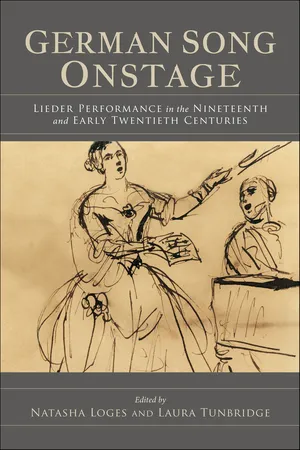
German Song Onstage
Lieder Performance in the Nineteenth and Early Twentieth Centuries
- 302 pages
- English
- ePUB (mobile friendly)
- Available on iOS & Android
German Song Onstage
Lieder Performance in the Nineteenth and Early Twentieth Centuries
About This Book
A singer in an evening dress, a grand piano. A modest-sized audience, mostly well-dressed and silver-haired, equipped with translation booklets. A program consisting entirely of songs by one or two composers. This is the way of the Lieder recital these days. While it might seem that this style of performance is a long-standing tradition, German Song Onstage demonstrates that it is not. For much of the 19th century, the songs of Beethoven, Schubert, Schumann, and Brahms were heard in the home, salon, and, no less significantly, on the concert platform alongside orchestral and choral works. A dedicated program was rare, a dedicated audience even more so. The Lied was a genre with both more private and more public associations than is commonly recalled. The contributors to this volume explore a broad range of venues, singers, and audiences in distinct places and time periods—including the United States, the United Kingdom, Russia, and Germany—from the mid-19th century through the early 20th century. These historical case studies are set alongside reflections from a selection of today's leading musicians, offering insights on current Lied practices that will inform future generations of performers, scholars, and connoisseurs. Together these case studies unsettle narrow and elitist assumptions about what it meant and still means to present German song onstage by providing a transnational picture of historical Lieder performance, and opening up discussions about the relationship between history and performance today.
Frequently asked questions
Information
Concert: Anzeigen Donnerstag den 13. Januar 1825 Im Saale des Königlichen Schauspielhauses Großes Vocal= und Instrumental=Concert, Gegeben Von der Königlichen Sängerin Anna Milder. | |
Erster Theil | |
1. | Ouvertüre aus der Oper: Titus, von Mozart |
2. | Der Troubadour, Gedicht von C. v. Holtei, als Concertscene für Gesang, Orchester und Guitarre, eigends für die Koncertgeberin componirt von Carl Blum, und gesungen von derselben. |
3. | Phantasie für die Harfe, ausgeführt von dem Königl. Kammermusikus und ersten Harfenisten Hrn. Desargus. |
4. | Duett von J. Meyerbeer gesungen vom Königl. Sänger Herrn Devrient und Anna Milder. |
Zweiter Theil | |
5. | Ouvertüre aus der Oper: Figaro, von Mozart. |
6. | Große Scene von Haydn, gesungen von Anna Milder. |
7. | Variationen für die Violine, componirt von Carl Moeser, gespielt von dessen Schüler dem Königl. Eleven Carl Ebner. |
8. | Terzett von Beethoven, gesungen von der Königl. Sängerin Mad. Seidler, den Königl. Sängern Herren Stümer und Sieber. |
9. | Duett aus Romeo und Julietta, von Zingarelli, gesungen von Mad. Seidler und Anna Milder. |
10. | Die Forelle, Lied von Schubert, gesungen von Anna Milder. |
Billets zu 1. Rthlr. sind in der Musikhandlung des Herrn Schlesinger, unter den Linden Nr. 34., und des Herrn Gröbenschütz, an der Schleusenbrücke; im Schauspielhause beim Kastellan Hrn. Adler, und Abends an der Kasse zu haben. Der Anfang ist 7 Uhr das Ende 9 Uhr. Die Kasse wird um 6 Uhr geöffnet. | |
Table of contents
- Cover
- Title Page
- Copyright
- Contents
- Acknowledgments
- Introduction: Restaging German Song / Laura Tunbridge
- 1. “Eine wahre Olla Patrida [sic]”: Anna Milder-Hauptmann, Schubert, and Programming the Orient / Susan Youens
- 2. Song in Concert as Observed by the Schumanns: Toward the Personalization of the Public Stage / Benjamin Binder
- 3. From Miscellanies to Musical Works: Julius Stockhausen, Clara Schumann, and Dichterliebe / Natasha Loges
- 4. Natalia Macfarren and the English German Lied / Katy Hamilton
- 5. “For Any Ordinary Performer It Would Be Absurd, Ridiculous, or Offensive”: Performing Lieder Cycles on the American Stage / Heather Platt
- 6. The Concert Hall as a Gender-Neutral Space: The Case of Amalie Joachim, née Schneeweiss / Beatrix Borchard, Translated by Jeremy Coleman
- 7. Nikolai Medtner: Championing the German Lied and Russian Spirit / Maria Razumovskaya
- 8. From the Benefit Concert to the Solo Song Recital in London, 1870–1914 / Simon McVeigh and William Weber
- 9. German Song and the Working Classes in Berlin, 1890–1914 / Wiebke Rademacher
- 10. Lilli Lehmann’s Dedicated Lieder Recitals / Rosamund Cole
- 11. “Eine Reihe bunter Zauberbilder”: Thomas Mann, Hans Pfitzner, and the Politics of Song Accompaniment / Nicholas Attfield
- 12. Performers’ Reflections / Natasha Loges and Laura Tunbridge
- Timeline
- Index